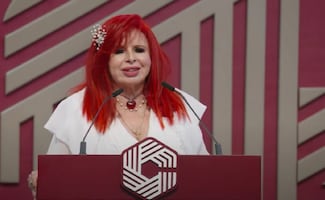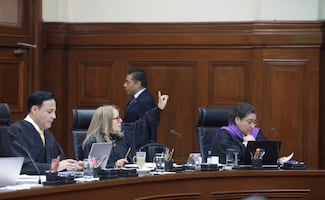Más Información

Sheinbaum confirma acuerdo con PT y PVEM, para impulsar reforma electoral; se enviará al Congreso este mes, anuncia

PRI acusa crisis de gobernabilidad y rebelión de morenistas contra Layda Sansores; gobierno de Campeche solo llegó a endeudarse, dicen

Rumbo al Mundial 2026, México y EU intercambian información de seguridad; Semar, Defensa y Comando Norte, se reúnen

Corte fija criterio para registrar a menores nacidos por gestación subrogada en CDMX; Batres advierte riesgos de explotación

Desaparece familia en Petatlán, Guerrero; elementos del Ejército y de la Guardia Nacional se unen a la búsqueda
By Giselle Rodríguez
Seven years ago Dr. Camila Pastor, PhD in Historical Anthropology of the Middle East by UCLA, had the dream of bringing the Arab Film Festival of San Francisco to Mexico City. The project was too expensive however, so she decided to organize instead an Arab Week with the purpose of showcasing Latin America's research on the region and showing a "de-orientalized" view of the Middle East to Mexicans.
Now in its seventh edition, the main topics of this year's Arab Week include "Orientalism", with the participation of specialists from Portugal, Spain, Morocco, Mexico and Argentina, and Heritage, a subject proposed by UNESCO, among many others.
With 400,000 Arabs in Mexico- including recent migrants and the descendants of historical migrations- the ethnicity would seem too small to matter, were it not for our common ancestry derived from the times of Al Andalus and the amazing social mobility of some Arab immigrants and their children in our country, such as telecommunications mogul Carlos Slim Helu, ranked No. 4 in Forbes World's Billionaires list with a net worth of around US$50 billion, and his cousin Alfredo Harp, with a net worth of US$1.2 billion and owner of Mexico's largest sporting goods retail chain Grupo Martí, both of them of Lebanese ancestry.
In Dr. Pastor's opinion the relationship of Mexico with Arab countries is more horizontal than the one they have with their former colonizers, which leads to a different conception about and dialogue with the region. Additionally, like Mexico, many Middle Eastern countries were once colonized, which make us share yet another common feature: cultural fracture.
As an anthropologist Dr. Pastor notes that more and more Mexican women are dating Arab men, which eventually stokes their interest in learning more about their culture. Moreover, the boom of belly dance over the last decade, along with a growing number of conversions to Islam and a blooming sense of anti-imperialist solidarity among male university students with "oppressed" Middle Eastern countries have increased the region's visibility in Mexico.
Over the past seven years, renowned specialists have participated in Mexico's Arab Week, such as James Gelvin, UCLA professor specialized in Syria and Elizabeth Picard, professor of the IREMAM at Aix-Marseille University, both of whom spoke about the Arab Spring; Joseph Massad, disciple of Edward Said who specialized in Middle Eastern sexuality and author of "Desiring Arabs"; Hamid Dabashi, professor at Columbia University specialized in Iranian literature; Nuha Khouri from the University of California, Santa Barbara who talked about modern art in the Arab-Islamic world and Isaías Barreñeda, publications coordinator of Casa Árabe from Spain, specialized in North Africa's union movements, among others.
The lectures delivered by keynote speakers will be published later this year in specialized journals and two volumes co-edited by CIDE and Colegio de México.
Along with Dr. Pastor, who is a professor at the History Division of the Center for Research and Teaching in Economics (CIDE), the organizers of Mexico's Seventh Arab Week include Dr. Laila Hotait, Lebanese filmmaker and professor at ITESM Querétaro, Dr. Indira Sánchez, professor of International Relations at ITESM Santa Fe, Dr. Mariam Saada, specialized in Moorish and Aljamía texts (manuscripts that use Arabic script for transcribing Romance languages) currently a UCMexus Postdoctoral Fellow at CIDE and Dr. Nofret Hernández Vilchis, journalist and professor at the School of Journalism and the Universidad Iberoamericana.
The 2016 Arab Week, that will take place from March 28 to April 6 in Mexico City at different venues, includes over 100 academic and cultural events, most of them free. To see the full program please visit: http://semanaarabe.cide.edu/programa.
Some other subjects that will be discussed as part of the academic program are: Fractures in Palestine, Syria, Iraq and Iran, Relations between Spain and the Arab world in modern times, Crisis of capitalism in Africa, homosexuality in the Arab world, Water resource management in the Middle East and Islam, while the cultural program includes an Arabic cooking class, an Arabic calligraphy workshop, film screenings and dance and music from different parts of the Arab world at the closing ceremony by Giselle Habibi accompanied by her dance students, Syrian oud player Imad Ibrahim and Mexican percussionist Francisco Bringas.
Noticias según tus intereses
[Publicidad]
[Publicidad]









